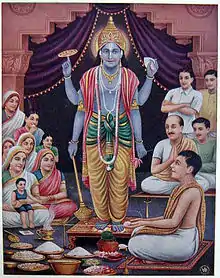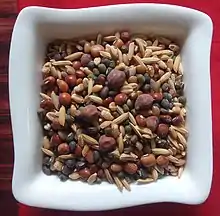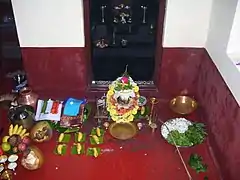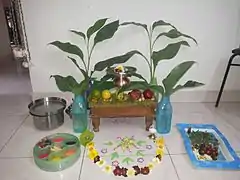

The Satyanarayana Puja is a puja (religious ritual worship) dedicated to the Hindu god Vishnu, who is also known as Satyanarayana.
The puja is described in the Skanda Purana,[1] a medieval era Sanskrit text.[2][3] According to Madhuri Yadlapati, the Satyanarayana Puja is an archetypal example of how "the Hindu puja facilitates the intimacy of devotional worship while enabling a humble sense of participating gratefully in a larger sacred world".[4]
Satyanarayana
| Satyanarayana | |
|---|---|
 | |
| Affiliation | Deva, aspect of Vishnu |
| Mantra | Om Namo Bhagavate Vasudevaya |
| Weapon | Sudarshana Chakra |
| Symbol | Banana tree |
| Mount | Garuda |
| Consort | Lakshmi |
Satyanarayana is another name of Vishnu or Narayana (Satya + Narayana). Satyanarayana is sometimes depicted as Krishna, an avatar of Vishnu.
According to one theory, the present form of the puja is attributed to the Hindu-Muslim veneration of Satya Pir (a supposed 16th-century Sufi saint of Bengal) which originated during the time of Mughal emperor Akbar's efforts to propagate his syncretic Din-i Ilahi sect. The accompanying story (katha) initially did not contain the dialogue between Narada and Vishnu and the character of the Hindu saint was essayed by the Pir; these changes were introduced over time along with other modifications bringing the story inline with the Hindu Puranas. Satya Pir is still worshipped in some regions of Bengal while the Satyanarayan katha has become prevalent all over India.[5][6]
The Puja
The puja narrates the Satyanarayana Katha (story), which dictates the various worldly and spiritual benefits the puja brings to performers. The Katha states how the deity Narayana vows to aid his devotees during Kali Yuga, the last of the four ages in Hindu cosmology, in particular the performers and attendees of the Satyanarayana Puja. The Katha narrates that the performance of the puja is in itself a promise to God, and recounts the plights of characters who either fail to complete the puja or forget their promises.[1]

Items needed for puja
The following is a list of items needed for the puja.[7][8][9][10]
- Haldi (turmeric powder)
- Kumkum (red, vermillion or sindoor)
- Navadhanya (nine types of grains each representing one of the navagraha, nine planets)
- Naivedhya (food which we offer to God)
- Incense sticks (agarbattis)
- Camphor
- Sandalwood paste
- A picture of Lord Satyanarayana
- A small idol (or coin) of Lord Satyanarayana (optional)
- Wheat or Jawar (not rice)
- Durva Or Dhoop grass (sacred grass according to Sanatana Dharma)
- Betelnut leaves (100)
- Betel nuts (50)
- Coins (40)
- Dry Dates/Almonds (50)
- Coconut (8)
- Flowers, Tulasi leaves
- Garland and floral garlands
- Two jars (Silver, Copper, Brass, or even earthen) – one for Kalash and another for the ritual
- Two flat plates
- A bell
- Low Altar table (for use as Altar)
- A large yellow cloth (to cover the Altar), yellow is the favorite color of Satnarayan.
- A piece of yellow or red cloth (for the Kalash)
- A ghee lamp (with at least three wicks)
- An oil lamp
- Cotton wicks
- Panchamrita (uncooked mixture of milk, yogurt, honey, sugar, and ghee)
Optional items
- Conch shell
- One thousand Tulasi (Indian Basil) leaves.
- Tulasi manjari (flower of tulasi)
- Banana tree/leaves as a canopy
- White sesame seeds tila two tablespoons (White tila or white sesame seeds is favorite of Lord Satnarayan. Rose is his preferred flower)
Gallery
 A kalasha and other puja items
A kalasha and other puja items Satyanarayana puja
Satyanarayana puja
See also
- Annavaram Satyanarayana Temple, temple dedicated to Satyanarayana in Andhra Pradesh, India
- Satya Pir, syncretic form of Satyanarayana in Bengal
References
- 1 2 Yadlapati, Madhuri M. (2013). Against Dogmatism: Dwelling in Faith and Doubt. University of Illinois Press. pp. 30–32.
- ↑ Richard D. Mann (2011). The Rise of Mahāsena. BRILL. p. 187. ISBN 9789004218864.
- ↑ Hans Bakker, ed. (2004). "Three Chapters of Saiva Material Added to the Earliest Known Recension of the Skanda Purana". Origin and Growth of the Purāṇic Text Corpus. Motilal Banarsidass. pp. 1–3. ISBN 9788120820494.
- ↑ Yadlapati 2013, p. 34.
- ↑ Dasa, Syamasundara (1965–1975). "सत्यनारायण". Hindi Sabdasagara. Kasi: Nagari Pracarini Sabha. p. 4931. Archived from the original on 19 July 2023. Retrieved 19 July 2023.
- ↑ Yamin, Mohammed (2009). Impact of Islam on Orissan Culture. New Delhi: Readywirthy Publications. p. 59. ISBN 978-81-89973-96-4.
- ↑ "Satyanarayana Puja".
- ↑ "Shri Satyanarayana Vrat Puja Items | Special Shri Satyanarayana Vrat Puja Samagri".
- ↑ "Archived copy" (PDF). Archived from the original (PDF) on 12 July 2018. Retrieved 9 September 2016.
{{cite web}}: CS1 maint: archived copy as title (link) - ↑ "Satyanarayana Swamy Pooja Procedure". 23 December 2014.
Further reading
- Thousand Names of Vishnu and Satyanarayan Vrat (ISBN 1-877795-51-8) by Swami Satyananda Saraswati, Devi Mandir.
External links
- Annavaram Devasthanam Official site for Annavaram Devastanam

